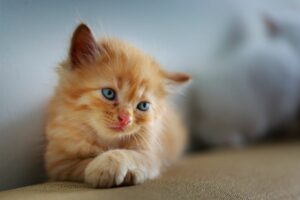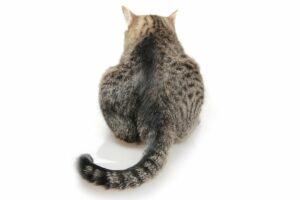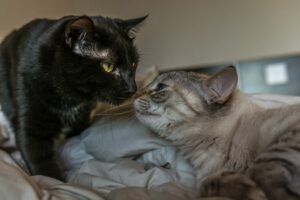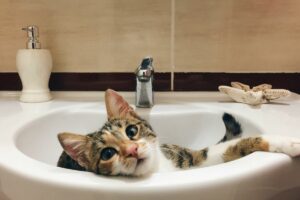Some cats are very affectionate and make this very obviously known, but others show their love differently.
Regardless, most cats value the presence of their human parents a lot (even if it’s only because you feed them!)
But what happens when a cat stops showing all kinds of loving gestures toward the owners?
And why has your cat suddenly started to ignore you?
I’ve definitely been there with my cats a few times, and it makes me feel awful.
So, in this article, I’ll help you to understand what you’ve done to offend your feline friend and why you are being ignored.
Reasons Your Cat May Be Ignoring You
You Left Your Cat Alone
Although cats want you to respect their private space, they will still show their disapproval if you aren’t there to shower them with love when they want you to.
I’ve received the cold shoulder after a long day at work or when I’ve been away on holiday.
Try to understand why your cat is behaving this way. And if it’s because you’ve been away longer than they expected, take comfort in the fact that they’ve missed you.
Now, go and adore them and win them over again! Take it from me, treats will help!
It’s worth remembering that some cats can get lonely too. Especially if they’ve always been used to company.
If this is the case, it can be worthwhile having more than one cat, or even another pet that your cat can get along with to keep them company.
This can be particularly helpful if you lead a busy lifestyle.
Apart from that, try spending quality time with your feline every day so that you have a strong bond together and your kitty doesn’t feel they need to ignore you.
There’s A New Addition In Your Household
There is no denying the fact that cats are big sulkers.
If you introduce a new pet, or even a human baby into the house for that matter, don’t be surprised to find that your kitty is disgruntled.
How dare you bring someone new into the house without consulting them first!
Give your kitty some time and space so they can adjust to the household changes and they should come around.
Remember, if you are introducing new pets into the house, it’s important to introduce the newbie to your existing cat/s slowly and, where possible, in a neutral spot in the house.
Don’t force them together – allow them to become acquainted in their own time.
If you’ve introduced another cat, always make sure there are enough food and water bowls, litter trays and toys around to prevent them fighting over resources.
Your Cat Is Unwell
A friendly cat who is suddenly ignoring you can be a sign of underlying sickness or health concerns.
Just like us, if a cat isn’t feeling well, it will want some space and some peace and quiet.
Cats do tend to hide pain and discomfort fairly well, so if your usually happy and friendly cat is suddenly ignoring you, and there’s no other obvious reason why, it might be time to talk to your vet.
If there are other changes in your cat’s behaviour, such as going to the toilet where it shouldn’t, or changes to its appetite, it’s important to tell the vet this.
You’ve Changed Their Routine
Cats are creatures of habit – they respond well to a solid routine. They like to know what to expect and when.
When we change our routine and it affects our kitty, this can annoy them. Your furry friend may show displeasure by distancing themselves from you.
You may expect the same treatment if you suddenly change your cat’s routine.
Or even if you move things around the house and they are not where the cat is used to finding them.
Therefore, a piece of good advice is that you shouldn’t modify routine tasks too much.
If you do need to make changes around the house, to your routine, or to your cat’s routine, try to do it slowly, and give your kitty time to adjust.
Your Cat Is Old
Just like humans, some cats can become cranky as they get older.
Older felines may detach themselves more from everyone in the household if they prefer being alone.
If you notice they just prefer some quiet time, don’t worry too much, and respect their decision.
But, as mentioned earlier, if the change is sudden, consider that it may be as a result of a health problem and seek advice from your vet.
Mood Swings
You heard me right! Even cats get moody and grumpy – and they can be worse than human teenagers – but most cat owners will be aware of this.
If your cat gets upset over something, even if this wasn’t your fault, they may well take it out on you by ignoring you.
If you think about it, we do the exact same. If we are upset, we often take it out on our nearest and dearest and may ignore them for a while or until our mood has blown over.
One of my cats is particular sassy and it’s not unheard of for her to ignore me if I’ve moved her from where I was going to sit or lay, or if I’ve had the nerve to offer her a treat she doesn’t like the smell of.
She gets very annoyed, gives me evils and then the cold shoulder, if I spray deodrant or use my hair dryer!
Try to understand what has upset your cat and, if possible, remove the irritant.
Most importantly though, just give your cat some time and space, and they’ll come around.
How To Win Your Cat Over Again
Here are some ideas for what to do if your cat is suddenly ignoring you, as well as some advice on how to win back their favour:
• Always respect your cat’s privacy and allow it to unwind itself. Your cat will eventually come back to you because it loves you unconditionally (honestly).
• Keep your voice in a gentle tone when you are around your feline so that if it is scared or unwell, you can console it without scaring them away.
• Feed the cats their favourite food or treats – this is one sure-fire way to win them back.
• Try to engage your cat in some playtime. If they’re particular annoyed, it may take some time before they feel like doing this though.
• Avoid forceful grabbing or unwanted interactions as it will only push your cat further away from you, making it more rebellious.
Final Thoughts
Cats love their owners but they appreciate their personal space.
And, just like us, sometimes cats get wound up about things and prefer to be alone.
If your cat is ignoring you, it’s important to try and understand why. In most cases, it’s probably because you’ve been away for some time, or because they’re annoyed about something.
But, it’s vital you understand what is normal behaviour for your feline, so that you can spot something unusual and seek help.





































